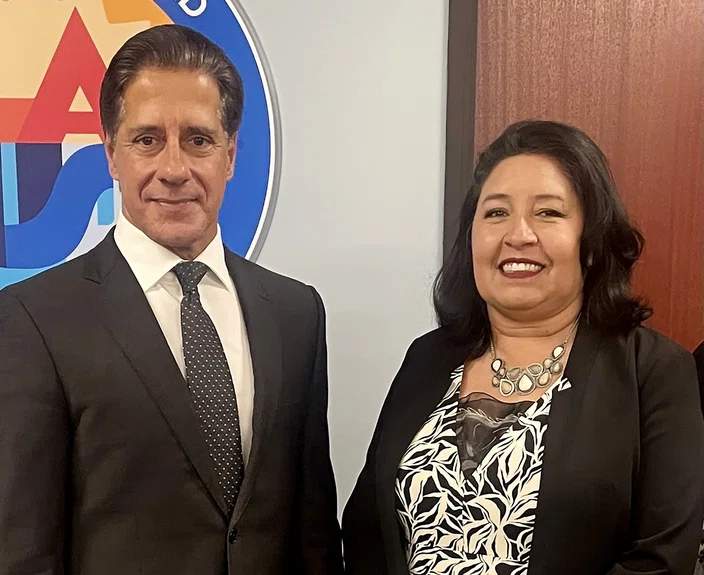News Briefs | FYI
September 16, 2024
District discusses cell phone policy during hearing
San Mateo-Foster City School District has restricted student cell phone use and seen a dramatic improvement in student engagement, according to a recent informational hearing about smartphones in California schools.
Members of State Superintendent of Public Instruction Tony Thurmond’s Task Force to Close the Digital Divide presented the Aug. 27 hearing in Sacramento.
At the hearing, Superintendent Thurmond gathered testimony from educators, parents, and students who have experienced a range of smartphone and social media policies on school campuses — from policies that remove smartphones from the educational environment by placing them in secure, locked pouches to policies that simply disincentivize smartphone use.
Panelists included Diego Ochoa, superintendent of San Mateo-Foster City School District, who spoke about the district’s decision in 2022 to limit students’ access to cell phones during the day using magnetically sealed pouches.
“We did it because we saw record levels of depression. We saw kids pulling away from their peers,” Ochoa said during the hearing. “We saw awful bullying. ... Kids taking videos they shouldn’t be taking.”
In just three months, following parent feedback sessions and a $90,000 initial investment to purchase the pouches, the district enacted the policy in 2022.
Ochoa pointed to survey responses from the California Healthy Kids Survey and the California School Staff Survey for evidence that student engagement and mental health is improving. For instance, in 2022-23, 30 percent of middle school teachers felt depression was a severe problem at their school. In 2023-24, only 13 percent of teachers report depression as a severe issue. More students also report feeling connected to people at their school, from 53 percent in 2018-19 to 70 percent in 2023-24.
Ochoa invited student Siyona Jain from the district’s Student Voices Council to share her opinion on the policy.
“It has really strengthened the way we communicate with each other and how we support each other,” the Bayside Academy eighth grader said. “When I walk through my corridors during passing period and at lunch, I see people actually talking to each other.”
Siyona provided feedback that schools should refrain from using terms like “ban,” which can make students feel like they are being punished. She also suggested schools find ways to reward students for adhering to the policy. For example, she said that at the end of school last year, pouches were collected from students during the last two days of school, and students refrained from using them in class, even though they had access to their phones.
“So I feel if we give some leeway to the policy that might be helpful just to give more encouragement for students to keep doing what they’re doing,” she said, “maybe a ‘leave your pouch at home’ day.”
Ochoa provided an example of how a student posting on Snapchat at the start of school at 7:45 a.m. could feel worse and worse as the school day progresses if they don’t get the desired reaction to their post online.
“That time period of the day when those phones are put away, it’s a break from all that,” he said. “It’s a break from all of that stress and anxiety.”
On Aug. 13 Gov. Gavin Newsom sent a letter to school leaders urging them to limit smartphone use on campuses as permitted by AB 272, citing the link between smartphone use and youth anxiety, depression and other mental health issues.
During the panel, Thurmond also provided an opportunity for lawmakers to present current, relevant bills that seek to keep children safe and healthy at school by restricting smartphone or social media use. Senator Henry Stern (D-27) presented SB 1283, and Assemblymember Josh Hoover presented AB 3216.
Find a link to a recording of the hearing at www.facebook.com/watch/live/?ref=watch_permalink&v=1026123522313105.
Committed to working together
Los Angeles Unified School District Superintendent Alberto Carvalho met with new ACSA Region 16 President Piedad Sanchez, principal of Northridge Middle School, to discuss critical needs of school leaders. Both made commitments to continue working together to better serve fellow administrators, teachers and students.

Los Angeles Unified School District Superintendent Alberto Carvalho welcomes new ACSA Region 16 President Piedad Sanchez.
FYI
Apply for Green Ribbon Schools program by Nov. 4
Applications for the California Green Ribbon Schools Award Program for 2024–25 are now open. The program honors schools, districts, and institutes of higher education for excellence in resource efficiency, health, wellness, and environmental and sustainability education. Find more information at www.cde.ca.gov/ls/fa/sf/greenribbonprog.asp. Applications close Nov. 4. Email the California Green Ribbon Schools team at greenribbonschools@cde.ca.gov with any questions.
LEAs: Grants available for classified teacher program
Classified grant awards of up to $4,800 per participant per year over the life of the grant, through June 30, 2026, are available to LEAs interested in securing funding to recruit and support classified staff who hold an associate or higher degree to complete a bachelor’s degree and/or earn a preliminary California teaching credential. The Classified Grant Program RFA is now available, and completed applications are due by 5 p.m. Nov. 8. Visit https://www.ctc.ca.gov/educator-prep/grant-funded-programs/Classified-Sch-Empl-Teacher-Cred-Prog for more information.
SBE seeks student board member for 2025-26
The California State Board of Education is seeking applications from students interested in serving as the 2025-26 student board member. The Student Board Member plays a crucial role in representing the perspectives and interests of students across California in important policy discussions and decisions. Students who qualify may apply at www.cde.ca.gov/be/ms/mm/sbestudentmember.asp. Application packages must be received no later than 5 p.m. Sept. 20.




